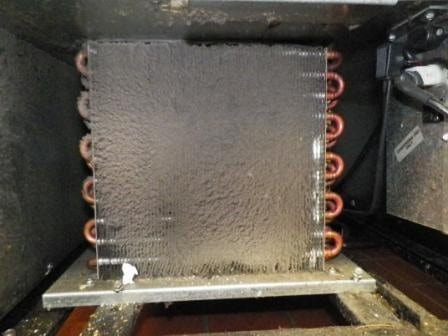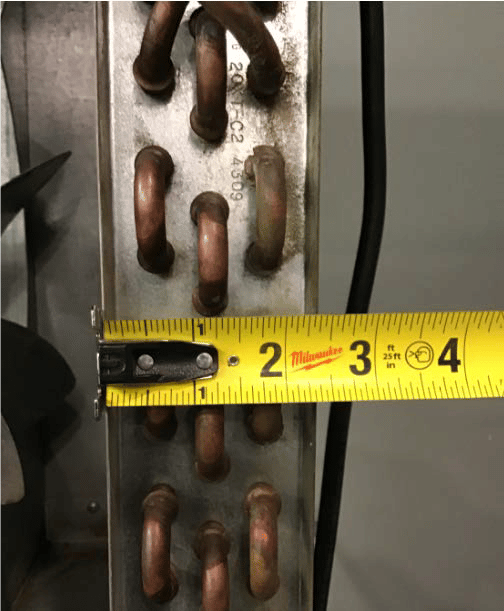The Importance of Clean Condenser Coils

Clean condenser coils are very important for proper operation of all refrigeration equipment. They keep refrigeration units operating cool, which is important for compressors to operate efficiently and allows the unit to maintain proper food temperature. Condenser coils that are not cleaned regularly will cause the compressor to overheat which then creates higher temperatures in the food storage areas and can lead to food loss. Compressor failures account for large expenses in a foodservice operation. The failure can usually be traced back to condenser coil issues. Grease, dust and items blocking air flow will all cause issues for condenser coils and in turn could cause compressor damage. Keeping up with regular condenser coil cleaning and maintenance can help avoid such issues.
It is easy to be fooled by coils that look clean on the surface but are dirty or plugged on the inside. The picture below shows how condenser coils are usually stacked, meaning they have multiple layers in which dust and grease can get trapped. A flashlight is a useful tool to check coils, but it is not always accurate. Sometimes light can be seen through the coil but that doesn’t mean it is clean. Dust will build up on the inside rows of tubes which will start an insulating effect. Light may be able to shine through the coil, but the tubing surface could still be insulated. Therefore, it is important to regularly clean condenser coils…even if they may seem clean, dirt and grease are building up. Monthly and quarterly cleaning can help prevent damage.

Monthly Cleaning
Coils should be inspected monthly and cleaned with a soft brush. A toothbrush can be a cheap, useful tool for cleaning smaller coils. A long-handled brush is a good tool to use so you don’t cut your hands on the sharp fins. Another option is a balled up, wet towel. Remember to keep your hand from touching the surface to void cuts.
Quarterly Cleaning
Quarterly cleaning of refrigeration unit condenser coils should be a more in-depth cleaning performed by someone technical. Look to in-house maintenance or a professional service technician to complete the quarterly cleaning. Depending on the type of cleaning the coils need, there will be specific locations, tools, materials, chemicals and knowledge that will be needed to complete the in-depth quarterly cleaning.
Your in-house maintenance staff or a professional service technician will inspect the coils to determine coil thickness, number of tubes, direction of airflow and other information they will need to determine the best course of action. They will use compressed gas or water for cleaning dust from a condenser coil while grease removal will require a chemical cleaning. A chemical cleaning requires certain chemicals, rinsing and multiple cleaning cycles. It can be very messy and time consuming.
Following a monthly and quarterly cleaning schedule for your condenser coils will help to maintain a properly functioning refrigeration unit and save you money on possible compressor failure in the long run.
